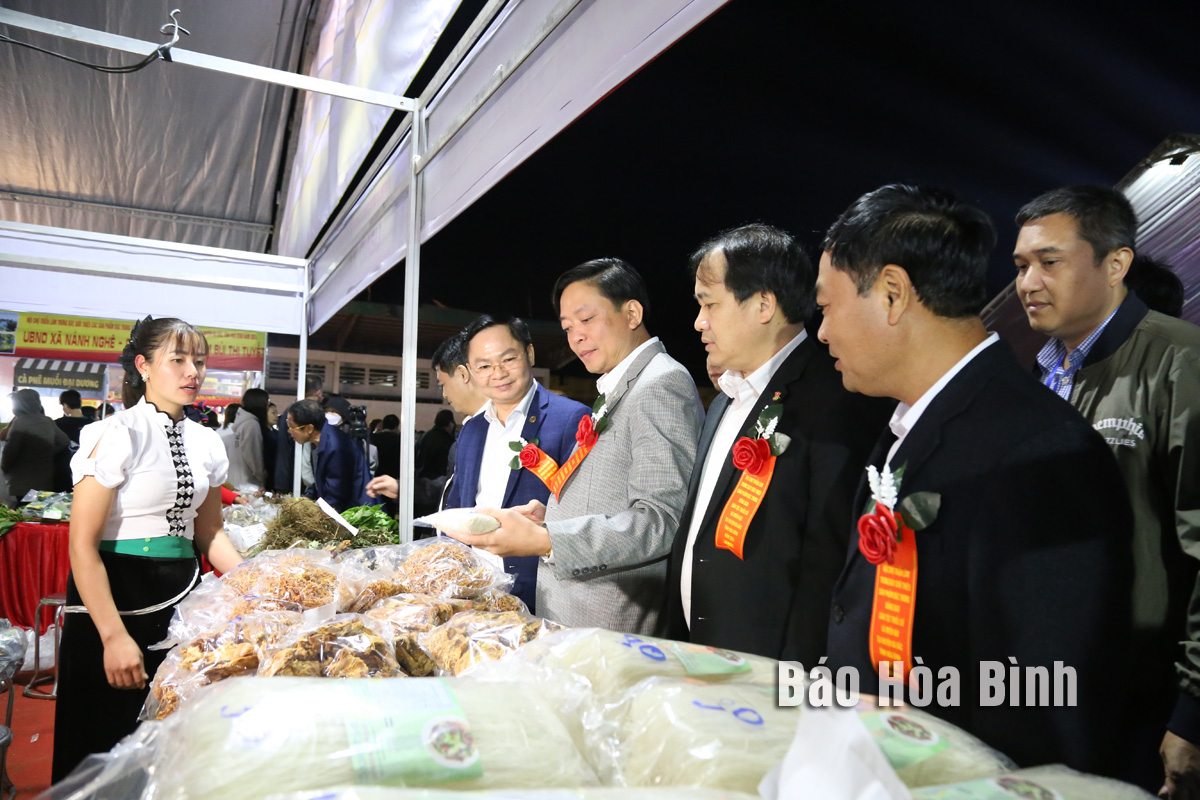
The Department of Industry and Trade of Hoa Binh in collaboration with the People's Committee of Da Bac district launched an exhibition fair on November 26 at the Da Bac District stadium, displaying unique products of ethnic minorities and mountainous areas in the district.

An art performance at the event.
Da Bac is home to many ethnic minority
groups, including Muong, Dao, Tay, and Thai, which leads to the creation of
distinctive local products that are deeply rooted in the history, traditions,
and cultural identity of each group. Some of the famous agricultural products
of Da Bac include glutinous rice, J02 rice, pork, chicken, Shan Tuyet tea, wild
honey, and various types of bamboo shoots.

Delegates press the button to mark the start of
the exhibition introducing the unique products from the ethnic minorities and
mountainous regions of Da Bac.
Through the event, Da Bac aims to introduce
its local products to both domestic and international consumers. The goal is to
enhance the value of these products, boost rural economic development, create
jobs for locals, and contribute to preserving and promoting traditional
cultural values. Additionally, the fair seeks to promote sustainable economic
growth, protect the natural environment, and improve the quality of life for
the local population.

Delegates visits booths showcasing local farm
produce.
The exhibition is part of the National
Target Programme for boosting socio-economic development of ethnic
minority-inhabited and mountainous regions in 2024. The weeklong fair feature
120 booths showcasing local agricultural products and goods.
According to data from the Hoa Binh Provincial Party Committee, the industrial production index for the first six months of 2025 is estimated to have increased by 20% compared to the same period last year. This marks the highest year-on-year growth rate for this period since 2020.
In the first six months of 2025, Hoa Binh province’s export turnover was estimated at 1.145 billion USD, marking an 18.11% increase compared to the same period in 2024. Import turnover was estimated at $ 804 million, a 17.15% increase, which helped the province maintain a positive trade balance.
The lives of the ethnic minority farmers in Tan Lac district have gradually improved thanks to the new directions in agricultural production. This is a testament to the collective strength fostered through the professional associations and groups implemented by various levels of the district’s Farmers’ Union.
With the motto the "product quality comes first,” after nearly one year of establishment and operation, Muong village’s Clean Food Agricultural and Commercial Cooperative, located in Cau Hamlet, Hung Son Commune (Kim Boi district), has launched reputable, high-quality agricultural products to the market that are well-received by consumers. The products such as Muong village’s pork sausage, salt-cured chicken, and salt-cured pork hocks have gradually carved out a place in the market and they are on the path to obtaining the OCOP certification.
In the past, the phrase "bumper harvest, rock-bottom prices" was a familiar refrain for Vietnamese farmers engaged in fragmented, small-scale agriculture. But today, a new spirit is emerging across rural areas of Hoa Binh province - one of collaboration, organisation, and collective economic models that provide a stable foundation for production.
Maintaining growing area codes and packing facility codes in accordance with regulations is a mandatory requirement for agricultural products to be eligible for export. Recently, the Department of Agriculture and Environment of Hoa Binh province has intensified technical supervision of designated farming areas and packing facilities to safeguard the "green passport" that enables its products to access international markets.





